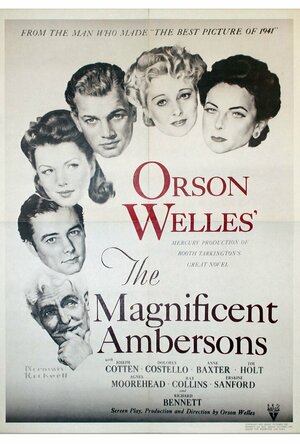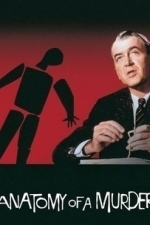Search
Search results
Cynthia Nixon recommended The Magnificent Ambersons (1942) in Movies (curated)
BankofMarquis (1832 KP) rated Anatomy of a Murder (1959) in Movies
Nov 30, 2018
One of the Best Courtroom Dramas of all Time
I have to admit, that (at times) the fun part of going to "SECRET MOVIE NIGHT" is the anticipation of not knowing what the film is. Sometimes the film is "good, not great" (like THE BLUES BROTHERS, BODY HEAT and A FACE IN THE CROWD) and other times it is a CLASSIC (Like CITIZEN KANE, THE APARTMENT and NETWORK). I am happy to report that this month's installment IS a classic, our old pal Jimmy Stewart in 1959's ANATOMY OF MURDER.
Directed by the great Otto Preminger, AOM is often referred to as the finest courtroom drama ever filmed. While I need to give that some thought, I will say AOM is right up there as one of the finest examples of a courtroom drama.
Starring Jimmy Stewart as "country lawyer" Paul Biegler, who is brought in to defend Army Lieutenant Manion (Ben Gazzara). Manion is accused of murdering a man that raped his wife (Lee Remick). The central mystery isn't "did Manion kill the man" (he did), it is more of "did he kill his wife's rapist or lover" and "will Biegler get away with the temporary insanity plea".
This is the kind of plot that we've all seen a dozen times on standard TV shows, but back in 1959, this type of film - and trial - was quite new and fresh and this film was "scandalous" in it's use of frank language. Remember, this is 1959 in Eisenhower "Happy Days" Americana, so hearing words like "bitch, panties, penetration, slut, sperm, bitch and slut" was quite shocking and led to many protests of the film.
Those who were turned off by the language and frankhandling of the subject matter lost out on an intriguing, well-acted, well-written and well-directed courtroom drama, where the verdict is up in the air right up until the foreman of the jury says "We, the jury, find the defendant..."
Jimmy Stewart is perfectly cast in the lead role of Defense Attorney, Biegler. Stewart brings an instant likableness and every man integrity quality to the role. His Attorney is down-to-earth but whip-smart, able to crack a joke to lighten the mood or explode in rage at an affront at a moment's notice. He goes toe-to-toe with Prosecuting Attorney Claude Dancer (a VERY young George C. Scott). Dancer is everything that Biegler is not, crisp, well-polished and arrogant. While it would have been very easy to paint these two characters as good (Stewart) and bad (Scott), Director Preminger and screenwriter Wendell Mayes shy away from this and show these two as fierce competitors playing a very serious game of chess - and this works very well, indeed. Both Stewart and Scott were nominated for Oscars for their work as Best Actor and Supporting Actor respectively.
The Supporting cast is superb, featuring such 1950's/early 1960's stalwarts as Arthur O'Connell (also Oscar nominated as Stewarts's alcoholic law mentor), the always good Eve Arden, Orson Bean and Katherine Grant. It also features three character actors in small roles (witnesses in the trial) who you would recognize from other things - Murray Hamilton (the Mayor in Jaws), Howard McNear (Floyd the Barber from Mayberry) and Joseph Kearns (Mr. Wilson in Dennis the Menace).
Special notice needs to be made for Lee Remick as the sultry and flirtatious woman at the core of the film. Remick is superb in this role, and that is fortunate, for if she wasn't believable in the "would she or won't she" role that she is asked to play, then the film could have easily fallen apart. But the real bright spot in this film is the scene stealing Joseph N. Welch as the Judge in the case. His performance as the judge is the perfect "third leg" to the Stewart/Scott stool, balancing charm, folksiness and strength in even portions (depending on what is needed to balance the other two).
Otto Preminger (LAURA, STALAG 17) is a Director who's name is beginning to fade into the dust of the past - and that's too bad, for he is a strong director who knows how to frame a scene and pace a film. Even though AOM is 2 hours and 40 minutes of talking, it never feels long or slow.
Two other aspects of this film need to be mentioned - the "jazz" score by the great Duke Ellington (which won a grammy) is perfectly suited to the themes and mood of this film and the opening title sequence (and movie poster) is reminiscent of an Alfred Hitchock film - and that is because they are done by frequent Hitchock contributor Saul Bass.
Nominated for 7 Oscars (it won zero, falling to the juggernaut that was BEN HUR that year), ANATOMY OF A MURDER is an intriguing courtroom drama that also opens the door to performers of the past. Well worth the time investment, should you run across it (it is frequently shown on TCM).
Letter Grade: A
9 (out of 10) stars and you can take that to the Bank(ofMarquis)
Directed by the great Otto Preminger, AOM is often referred to as the finest courtroom drama ever filmed. While I need to give that some thought, I will say AOM is right up there as one of the finest examples of a courtroom drama.
Starring Jimmy Stewart as "country lawyer" Paul Biegler, who is brought in to defend Army Lieutenant Manion (Ben Gazzara). Manion is accused of murdering a man that raped his wife (Lee Remick). The central mystery isn't "did Manion kill the man" (he did), it is more of "did he kill his wife's rapist or lover" and "will Biegler get away with the temporary insanity plea".
This is the kind of plot that we've all seen a dozen times on standard TV shows, but back in 1959, this type of film - and trial - was quite new and fresh and this film was "scandalous" in it's use of frank language. Remember, this is 1959 in Eisenhower "Happy Days" Americana, so hearing words like "bitch, panties, penetration, slut, sperm, bitch and slut" was quite shocking and led to many protests of the film.
Those who were turned off by the language and frankhandling of the subject matter lost out on an intriguing, well-acted, well-written and well-directed courtroom drama, where the verdict is up in the air right up until the foreman of the jury says "We, the jury, find the defendant..."
Jimmy Stewart is perfectly cast in the lead role of Defense Attorney, Biegler. Stewart brings an instant likableness and every man integrity quality to the role. His Attorney is down-to-earth but whip-smart, able to crack a joke to lighten the mood or explode in rage at an affront at a moment's notice. He goes toe-to-toe with Prosecuting Attorney Claude Dancer (a VERY young George C. Scott). Dancer is everything that Biegler is not, crisp, well-polished and arrogant. While it would have been very easy to paint these two characters as good (Stewart) and bad (Scott), Director Preminger and screenwriter Wendell Mayes shy away from this and show these two as fierce competitors playing a very serious game of chess - and this works very well, indeed. Both Stewart and Scott were nominated for Oscars for their work as Best Actor and Supporting Actor respectively.
The Supporting cast is superb, featuring such 1950's/early 1960's stalwarts as Arthur O'Connell (also Oscar nominated as Stewarts's alcoholic law mentor), the always good Eve Arden, Orson Bean and Katherine Grant. It also features three character actors in small roles (witnesses in the trial) who you would recognize from other things - Murray Hamilton (the Mayor in Jaws), Howard McNear (Floyd the Barber from Mayberry) and Joseph Kearns (Mr. Wilson in Dennis the Menace).
Special notice needs to be made for Lee Remick as the sultry and flirtatious woman at the core of the film. Remick is superb in this role, and that is fortunate, for if she wasn't believable in the "would she or won't she" role that she is asked to play, then the film could have easily fallen apart. But the real bright spot in this film is the scene stealing Joseph N. Welch as the Judge in the case. His performance as the judge is the perfect "third leg" to the Stewart/Scott stool, balancing charm, folksiness and strength in even portions (depending on what is needed to balance the other two).
Otto Preminger (LAURA, STALAG 17) is a Director who's name is beginning to fade into the dust of the past - and that's too bad, for he is a strong director who knows how to frame a scene and pace a film. Even though AOM is 2 hours and 40 minutes of talking, it never feels long or slow.
Two other aspects of this film need to be mentioned - the "jazz" score by the great Duke Ellington (which won a grammy) is perfectly suited to the themes and mood of this film and the opening title sequence (and movie poster) is reminiscent of an Alfred Hitchock film - and that is because they are done by frequent Hitchock contributor Saul Bass.
Nominated for 7 Oscars (it won zero, falling to the juggernaut that was BEN HUR that year), ANATOMY OF A MURDER is an intriguing courtroom drama that also opens the door to performers of the past. Well worth the time investment, should you run across it (it is frequently shown on TCM).
Letter Grade: A
9 (out of 10) stars and you can take that to the Bank(ofMarquis)

